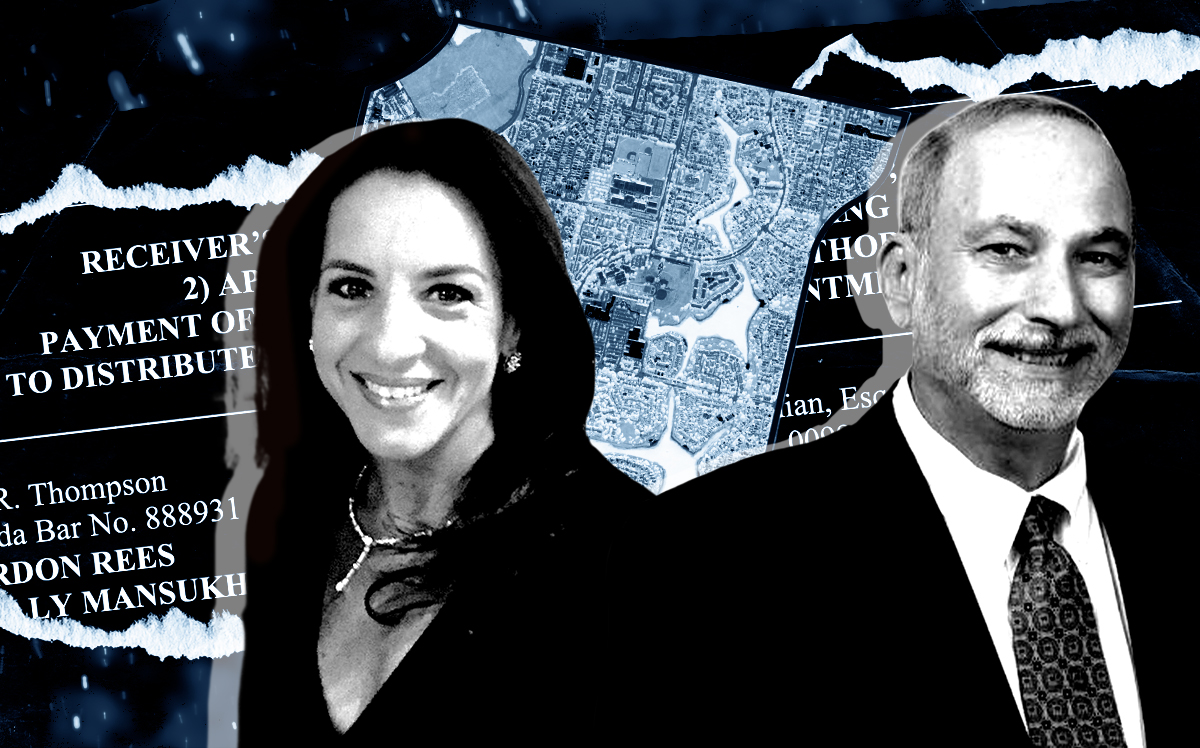Retiree Jesus Rodriguez was on the verge of losing his home to foreclosure in January.
After missing maintenance fees and six $307 monthly payments for a special assessment at the Star Lakes condo complex in north Miami-Dade County, he pleaded for a payment plan. At first, he said association leaders seemed amenable to the idea. But then a lien popped up in Rodriguez’s mailbox, forcing him into the foreclosure process.
The 75-year-old felt that the board was trying to seize his unit.
“They knew I had no mortgage,” he said, adding that a lender would have first priority in a foreclosure. “When you are on your own, it’s easy for them to target you and take your property.”
Rodriguez is among the dozens of owners who suspect fraud by leadership of Star Lakes, a 55-and-older complex on the northeast corner of Northeast 187th Street and Northeast Second Avenue, between Miami Gardens and North Miami Beach. The buildings were completed between 1965 and 1969.
In lawsuits filed against the association and in interviews with The Real Deal, unit owners claim association leadership illegally imposed $3 million in special assessments, but failed to make promised and required repairs. Unit owners suspect some former and current association leaders of a self-enrichment scheme, as many of the 17 buildings remain in poor condition, residents say.
“Does this look like $3 million has been spent?” unit owner Kareen LeCorps said, gesturing toward some of the pastel-colored low-rise buildings.
Star Lakes is not an anomaly. Across South Florida, residents who live in association-governed communities have been sounding the alarm about allegedly nefarious dealings by board members. This has intensified following the uncovering of major fraud at the Hammocks, the largest homeowners association in South Florida.
At some properties, residents have claimed they live under a tyrannical-type governance, riddled with opaque financial records. Those who speak out face retaliation.
Read more



Some Star Lakes leaders deny the allegations. They counter that the complex, like many others, is dealing with years of deferred repairs and skyrocketing insurance premiums. Following the deadly Surfside condo collapse two years ago, the state is requiring that associations fully fund their financial reserves and has tightened regulations for repairs. The latter has prompted the need for assessments that many owners can’t afford.
At Star Lakes, more than 200 unit owners, or about half, are delinquent on their dues, while roughly half the buildings are past due on the legally required recertification, said board president Francis Jacob.
The buildings are up to 58 years old. Miami-Dade requires condo buildings to be recertified when they turn 40 years old, and every decade afterwards.
“A lot of the [allegations] that are being thrown around are very, very serious allegations by people who don’t know what is going on,” he said. “Most of the people who are dissatisfied are the ones that are not paying.”
A study completed last year showed the association needs $10 million to fully fund its reserves to complete needed repairs.
Board members were poised to take out a line of credit to cover the costs at a 9.5 percent annual interest rate. But this month the financier, like many others before it, decided against lending to Star Lakes, according to Beshoy Rizk, the association’s attorney.
Now, the complex needs to determine how it will raise the funds to make the required repairs, or risk being deemed unsafe by the county.
Unit owners, who say they can’t afford a new assessment, aren’t sold on the $10 million amount. They fear it’s a ploy by board members to force residents into foreclosure and
embark on bulk unit buyouts, residents and their attorneys allege.
James Walter, an attorney for some of the owners, points to the property’s value as a redevelopment.
“My guess is these people [said] ‘Let’s see if we can purchase enough units to try to decertify the condominium'” Walter said. “Everything they have done to date has been questionable.”
All roads start at Building 12
In December 2017, a fire broke out at Building 12, forcing residents to move out.
The association collected $1.5 million in insurance funds and imposed a $700,000 levy, as part of a bigger $1.3 million assessment for repairs in 2020, records show.
No one in the 24-unit building has been able to move back in.
“I’ve been telling my friends. ‘I’ll never get back in there,’” said unit owner Lee Blount. The board and property manager “just keep making excuses.”
Construction didn’t start until late 2020, despite the association previously presenting invoices for repairs, according to lawsuits filed by residents. Some owners claim the association comes up with repair costs without showing proof it bid out the work. The board imposed the assessment on all units, even though each building should carry its own costs, the suits claim.
In court filings, the association countered that it has completed most of Building 12’s repairs. It said it can charge all unit owners to fix one building because it operates as a unified association.
Walter said the association only started to begin repairs after he filed to amend a lawsuit that residents previously lost. “The board and the property manager knew they were doing things incorrectly and then tried to hide it,” he said.
Denise Brooks, Star Lakes’ property manager since 2016, disputes many of the owners’ allegations.
“If you look at it from an outside point of view and be impartial, you’ll understand that this is a very litigious community,” Brooks said, deferring a number of questions to the association board’s attorney, who didn’t respond to a request for comment.
Brooks denied that she does not provide requested records, and blamed residents for being rude.
“The only time I will not respond is when you get derogatory and call me names,” she said. “I’m not paid for people to be disrespectful.”
Rizk, the association’s attorney, who has been representing the association on day-to-day matters since July, said Building 12’s repairs were held up because of slow insurance disbursements and construction delays that are now common.
TRD reached out to many of the board members who led the association when the assessment was imposed in 2020. None returned requests for comment.
Christopher Saia, who served on the board in 2018, said the association had offers to repair Building 12 from two reputable contractors, but other board members rejected the proposals.
While he declined to disclose who stood in the way, he described an issue that isn’t as clear-cut as unit owners pitted against board members. Some board members who shot down contractor approvals were cronies of the very residents now alleging fraud, Saia claimed.
“That place is so screwed up,” Saia said. “The real answer is [there is] a lot of deferred maintenance, and the folks can’t afford to take care of it. That place is a disaster … absolute disaster.”
Murky shell game?
A recent revelation that’s at the crux of residents’ allegations of a self-enrichment scheme is that some former and current board members own multiple units at Star Lakes.
Purchasing a second or additional units as an investment is a violation of the condo declaration, said Walter, the attorney for some unit owners.
Entities tied to ex-board president Jonathan Rothman bought seven condos in 2019 and 2021, records show. Other entities tied to former board secretary Raymond Aleman bought four condos from 2018 to last year.
In some cases, entities tied to Rothman, Aleman and their family members bought units, according to records. An affiliate managed by Rothman and Aleman owns a unit in Building 12 that the company purchased in 2019.
Some condos traded at a gain, records show: Andover Property Group, tied to Rothman’s wife, Marina Mallmann, paid $46,500 for a unit in 2018, and later transferred it to a company led by Aleman. In May, that entity sold the unit for $90,000 — nearly double the previous purchase price.
“Those entities are constantly changing and shifting,” Walter said, calling it “just another version of a shell game.”
Rothman, Aleman and Mallmann didn’t return requests for comment.
Bad guys or amateurs
Attorney Faudlin Pierre, who has represented owners who sued Star Lakes, called the “years and years of mismanagement” a “rare case.”
Yet, he stopped short of saying it was intentional. Instead, Pierre said it could be an issue common among condo associations where volunteer board members are simply in over their heads. Many serving on boards don’t have the relevant experience needed and at the same time are dealing with backlash from residents.
“I think you can plead ignorance for a certain amount of time,” Pierre said. “But I am not confident enough to say there’s been criminal activity.”
In the meantime, Rodriguez, the 75-year-old owner who owed the association months of fees, considers himself fortunate because he was able to borrow $10,000 from his brother to stave off the foreclosure judgment.
“I spent a year without cable and Internet to pay for that,” he said. “It’s really tough.”
